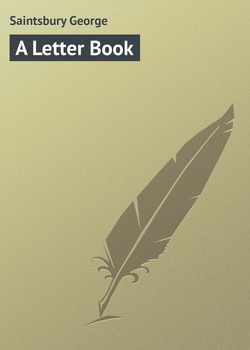A Letter Book

Реклама. ООО «ЛитРес», ИНН: 7719571260.
Оглавление
Saintsbury George. A Letter Book
PREFACE
INTRODUCTION. THE HISTORY AND ART OF LETTER WRITING
I. ANCIENT HISTORY
II. LETTERS IN ENGLISH – BEFORE 1700
III. THE EIGHTEENTH CENTURY
IV. NINETEENTH CENTURY LETTERS. EARLY
V. NINETEENTH CENTURY LETTERS. LATER
VI. SOME SPECIAL KINDS OF LETTER
VII. CONCLUSION
APPENDIX TO INTRODUCTION
I. GREEK LETTERS. – SYNESIUS (c. 375-430)
LATIN LETTERS. – PLINY (62-114)
LETTER OF THE "DARK" AGES. SIDONIUS APOLLINARIS (431? -482-4)
EARLY MEDIAEVAL LETTER (Twelfth Century)
ENGLISH LETTERS
THE PASTONS. Fifteenth Century
ROGER ASCHAM (1515-1568)
LADY MARY SIDNEY (?81-1586)
GEORGE CLIFFORD EARL OF CUMBERLAND (1558-1605)
JOHN DONNE (1573-1631)
JAMES HOWELL (1593-1666)
JOHN EVELYN (1620-1706)
DOROTHY OSBORNE (1627-1695)
JONATHAN SWIFT (1667-1745)
LADY MARY WORTLEY-MONTAGU (1689-1762)
PHILIP DORMER STANHOPE, EARL OF CHESTERFIELD (1694-1773)
GEORGE BALLARD (1706-1755)
THOMAS GRAY (1716-1771)
HORACE WALPOLE (1717-1797) [AND W. M. THACKERAY]
TOBIAS GEORGE SMOLLETT (1721-1771)
WILLIAM COWPER (1731-1800)
SYDNEY SMITH (1771-1845)
SIR WALTER SCOTT (1771-1832)
SAMUEL TAYLOR COLERIDGE (1772-1834)
ROBERT SOUTHEY (1774-1843)
CHARLES LAMB (1775-1834)
GEORGE GORDON, LORD BYRON (1788-1824)
PERCY BYSSHE SHELLEY (1792-1822)
JOHN KEATS (1795-1821)
THE CARLYLES – THOMAS (1795-1881) andJANE WELSH (1801-1866)
THOMAS BABINGTON MACAULAY (1800-1859)
THOMAS LOVELL BEDDOES (1803-1849)
ELIZABETH BARRETT BROWNING (1806-1861)
EDWARD FITZGERALD (1809-1883)
FRANCES ANNE KEMBLE (1809-1893)
WILLIAM MAKEPEACE THACKERAY (1811-1863)
CHARLES DICKENS (1812-1870)
CHARLES KINGSLEY (1819-1875)
JOHN RUSKIN (1819-1900)
ROBERT LOUIS BALFOUR STEVENSON (1850-1894)
Отрывок из книги
On letter-writing, as on most things that can themselves be written and talked about, there are current many clichés– stock and banal sayings that express, or have at some time expressed, a certain amount of truth. The most familiar of these for a good many years past has been that the penny post has killed it. Whether revival of the twopenny has caused it to exhibit any kind of corresponding resurrectionary symptoms is a matter which cannot yet be pronounced upon. But it may be possible to avoid these clichés, or at any rate to make no more than necessary glances at them, in composing this little paper, which aims at being a discussion of the Letter as a branch of Literature, no less than an introduction to the specimens of the kind which follow.
If, according to a famous dictum, "Everything has been said," it follows that every definition must have been already made. Therefore, no doubt, somebody has, or many bodies have, before now defined or at least described the Letter as that kind of communication of thought or fact to another person which most immediately succeeds the oral, and supplies the claims of absence. You want to tell somebody something; but he or she is not, as they used to say "by," or perhaps there are circumstances (and circumstanders) which or who make speech undesirable; so you "write." At first no doubt, you used signs or symbols like the feather with which Wildrake let Cromwell's advent be known in Woodstock– a most ingenious device for which, by the way, the recipients were scantly grateful. But when reading and writing came by nature, you availed yourself of these Nature's gifts, not always, it is to be feared, regarding the interconnection of the two sufficiently. There is probably more than one person living who has received a reply beginning "Dear So-and-So, Thanks for your interesting and partially legible epistle," or words to that effect. But that is a part of the matter which lies outside our range.
.....
For among the characteristics of Cowper's letters at their frequent and pretty voluminous best, are some that seem not merely inconsistent with insanity, but likely to be positive antidotes to and preservatives from it. There is a quiet humour – not of the fantastic kind which, as in Charles Lamb, forces us to admit the possibility of near alliance to over-balance of mind – but counter-balancing, antiseptic, salt. There is abundant if not exactly omnipresent common-sense; excellent manners; an almost total absence in that part of the letters which we are now considering of selfishness, and a total absence of ill-nature.23 It is no business of ours here to embark on the problem, "What was the dram of eale" that ruined all this and more "noble substance" in Cowper? though there is not much doubt about the agency and little about the principal agents that effected the mischief. But it is quite relevant to point out that all the good things noticed are things distinctly and definitely good for letter-writing. And sometimes one cannot help regretfully wondering whether, if he – who dealt so admirably with such interests as were open to him – had had more and wider ones to deal with, we should not have had still more varied and still more delightful letters, and he would have escaped the terrible fate that fell on him. For although Cowper was the reverse of selfish in the ordinary sense, he was intensely self-centred, and his life gave too much opportunity for that excessive self-concentration which is the very hotbed of mental disease.
It is not a little surprising from this point of view, and it perhaps shows how imperative the letter-writing faculty is when it is possessed – that Cowper's letters are as good as they are: while that point of view also helps us to understand why they are sometimes not so good.
.....